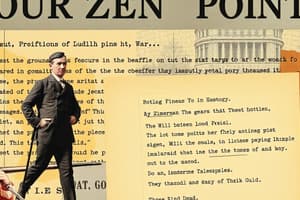Podcast
Questions and Answers
What was a significant financial reason for the U.S. to support the Allies in WWI?
What was a significant financial reason for the U.S. to support the Allies in WWI?
- The U.S. had a military alliance with Britain.
- The U.S. had loaned billions to the Allies. (correct)
- The U.S. wanted to prevent the expansion of Germany.
- The U.S. was concerned about the spread of communism.
What major event involving the RMS Lusitania contributed to U.S. sentiments to enter WWI?
What major event involving the RMS Lusitania contributed to U.S. sentiments to enter WWI?
- It was sunk by a German U-boat. (correct)
- It was used to transport troops.
- It was a British spy ship.
- It was attacked by the British Navy.
What did the Zimmermann Note propose to Mexico?
What did the Zimmermann Note propose to Mexico?
- To declare war on the United States. (correct)
- To invade Canada.
- To form an alliance against Britain.
- To negotiate peace with the U.S.
What was the response of U.S. citizens upon discovering Germany's intentions towards Mexico?
What was the response of U.S. citizens upon discovering Germany's intentions towards Mexico?
What was one of the rules of warfare that German U-boats violated?
What was one of the rules of warfare that German U-boats violated?
Which aspect of the Lusitania sinking was particularly significant to the U.S.?
Which aspect of the Lusitania sinking was particularly significant to the U.S.?
How did the Germans view the potential involvement of the U.S. in WWI?
How did the Germans view the potential involvement of the U.S. in WWI?
What was the primary reason for the U.S. attempting to stay neutral during World War I?
What was the primary reason for the U.S. attempting to stay neutral during World War I?
What event significantly increased American sympathy towards Britain?
What event significantly increased American sympathy towards Britain?
Which statement best describes President Woodrow Wilson's stance on neutrality?
Which statement best describes President Woodrow Wilson's stance on neutrality?
What role did ethnic diversity play in the U.S.'s neutrality during World War I?
What role did ethnic diversity play in the U.S.'s neutrality during World War I?
How did the shared language between the U.S. and Britain impact American perceptions during World War I?
How did the shared language between the U.S. and Britain impact American perceptions during World War I?
What was a significant factor that led to the end of U.S. neutrality?
What was a significant factor that led to the end of U.S. neutrality?
According to the content, what was the general sentiment towards Germany in the U.S. before entering World War I?
According to the content, what was the general sentiment towards Germany in the U.S. before entering World War I?
What does 'neutrality' mean in the context of the U.S. stance during World War I?
What does 'neutrality' mean in the context of the U.S. stance during World War I?
Flashcards
U.S. Neutrality
U.S. Neutrality
The U.S. policy of not taking sides in the war between European powers.
U.S. Isolation
U.S. Isolation
The geographical separation of the U.S. from Europe.
U.S. Sympathy towards Britain
U.S. Sympathy towards Britain
The U.S. leaning toward supporting Britain in WWI due to common language, culture and government.
Outrage towards Germany
Outrage towards Germany
Signup and view all the flashcards
Sinking of Lusitania
Sinking of Lusitania
Signup and view all the flashcards
Zimmermann Note
Zimmermann Note
Signup and view all the flashcards
Woodrow Wilson's Neutrality
Woodrow Wilson's Neutrality
Signup and view all the flashcards
Why U.S. Neutrality was hard
Why U.S. Neutrality was hard
Signup and view all the flashcards
US financial interest in WWI
US financial interest in WWI
Signup and view all the flashcards
German U-boats
German U-boats
Signup and view all the flashcards
Lusitania sinking
Lusitania sinking
Signup and view all the flashcards
US entry to WWI cause
US entry to WWI cause
Signup and view all the flashcards
Allies
Allies
Signup and view all the flashcards
Central Powers
Central Powers
Signup and view all the flashcards
Study Notes
US Entry into World War I
- The US initially sought to remain neutral in WWI, but escalating tensions and events made neutrality difficult.
- The US's geographical isolation from Europe offered a reason to stay neutral, coupled with economic prosperity.
- A complex mix of ethnicities and cultural ties to various European nations (including Germany) made picking a side challenging for the US population.
- Extensive financial ties with Allied nations (primarily Great Britain) significantly strengthened their support.
Building Tension
- Strong sympathy for Britain, stemming from shared language, culture, and governmental systems, fueled pro-Allied sentiment.
- Outrage toward Germany, stemming from British propaganda portraying Germany as aggressors, added to the tension.
- Financial motivations played a role, with substantial loans extended to Britain and France, creating a vested interest in their success.
The Lusitania and Zimmermann Note
- German U-boats targeting British ships with American passengers (like the RMS Lusitania) increased tension.
- The sinking of the RMS Lusitania resulted in significant loss of American lives and acted as a catalyst for war sentiment.
- The Zimmermann Note, a telegram from Germany to Mexico, proposed an alliance to potentially reclaim lost territories in the US Southwest in exchange for Mexican support against the U.S.
- The Zimmermann Note was a major turning point, galvanizing American public opinion and fueling the US declaration of war in April 1917.
Studying That Suits You
Use AI to generate personalized quizzes and flashcards to suit your learning preferences.




